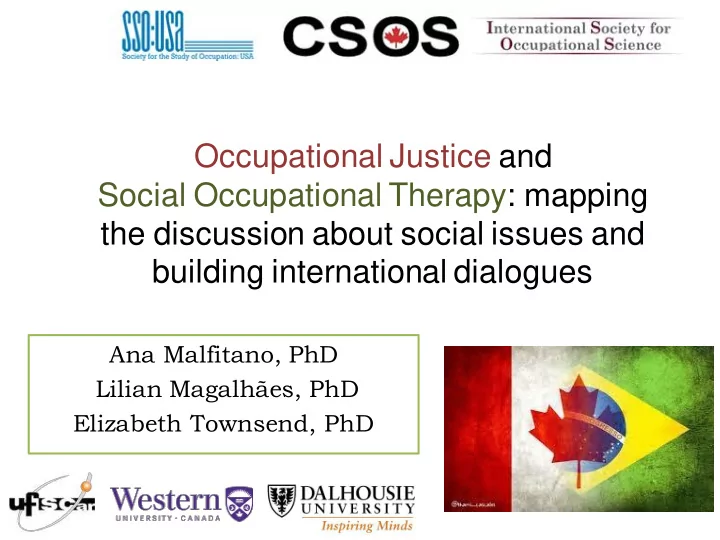

Occupational Justice and Social Occupational Therapy: mapping the discussion about social issues and building international dialogues Ana Malfitano, PhD Lilian Magalhães, PhD Elizabeth Townsend, PhD
Why connect internationally? - Social issues are interrelated, despite local contexts - Knowledge production and solidarity - A research project is underway, for which the main question is: What are the current discussions about social issues in occupational science and occupational therapy around the world?
Brazil and Canada : similarities that create opportunities to talk about social issues
Who are the potential international collaborators? How can we find and connect them? - Brazilian policies have been encouraging international partnerships “ Science without borders” - Visiting PhD candidates - Research collaboration - Post-doctoral fellows
S OCIAL ISSUES AND O CCUPATIONAL THERAPY : MAPPING THE DISCUSSION AND BUILDING INTERNATIONAL DIALOGUES FUNDED BY CNP Q B RA Z IL , 2013
Project overview: This project is framed as a dialogical encounter, informed by Paulo Freire’s legacy of critical reflexivity . It is also inspired by the proposition of knowledge for solidarity , according to Souza Santos (2014): “ Solidarity as a form of knowledge is the recognition of the other both as an equal, whenever difference makes her or him inferior, and as a different, whenever equality jeopardizes his or her identity.” (p. 156)
It has been divided in three subprojects: I) Scoping review of the literature on the production of occupational therapy and occupational science related to social issues in Portuguese and English.
II) Interviews with researchers identified nationally and internationally will be performed, compiling their narratives about their production in the field, the theoretical foundations adopted and future challenges. III) Working groups will be developed in order to integrate the previous two subprojects and foster an expanded discussion in the format of a scientific event.
Social Occupational Therapy In Brazil, social occupational therapy aims to work toward social inclusion of individuals and groups who experience persistent social, cultural, and economic disadvantage (Barros, Ghirardi, Lopes, 2005).
Social Occupational Therapy The claim for social occupational therapy is that a politically and ethically framed perspective is essential for researchers to understand contemporary social issues such as living conditions, inclusive entitlements, and social and occupational rights. (Malfitano, Lopes, Magalhães & Townsend, 2014) .
Literature review of Anglophone material: preliminary data Databases: Scopus, Web of Science and Cinahl Keywords: “occupational justice”, “occupational injustice”, “occupational apartheid”, “occupational rights” and occupational therapy Up to 2013, 88 peer reviewed texts were found
Preliminary findings Occupational justice : authors emphasize context and social injustice exploring occupational possibilities, specially from health system practices. Different population groups: elders, people with disabilities, people with mental health disorders, first nations, homeless and other vulnerable groups. Meaning and choice are prevalent topics
The language choices Occupational Justice : - Social Justice/injustice - Context - Occupation/Meaning - Cappability
Brazilian literature • Source: Brazilian Journals of Occupational Therapy (2) • Title, abstract and keywords were explored to identify the field of social occupational therapy • Up to 2010 , 25 peer reviewed texts were found • 10 Intervention Reports, 8 Theoretical Articles, 6 Research Articles and 1 Literature Review.
The language choices Preliminary findings in Social Occupational Therapy - Territory/Place - Social Technology/Models of Intervention - Collective Activities - Citizenship and Social and civil Rights
Common threads within the literature Social Occupational Therapy & Occupational Justice : - Participation - Rights (human, civil and social rights) - Critical approach - Connections between the collective dimension and the individual needs
What are the benefits of international collaboration? Try to contribute with an important ongoing international dialogue, such as the ISOS Discussion Forum regarding 'Critical' Occupational Science How can occupational science move forward in its development as a socially and politically engaged discipline?
What are the barriers and challenges for international collaboration? “ Occupation” (as an expression and as a concept) it is not well accepted in Brazil (Magalhaes & Galheigo, 2010): the issue of “translational contact zone” (Souza Santos, 2014) Much attention has been given to the contexts of each country and its specificities, preventing international analyses An international research agenda may be helpful to foster the dialogue between OT and OS and within OS
Research Agenda: Can occupation-based practical and conceptual technologies promote emancipatory actions in the social field?
References Barros, DD, Ghirardi, MI, Lopes, RE (2005). Social occupational therapy: a socio-historical perspective. In F. Kronenberg, S. S. Algado & N. Pollard (Eds.), Occupational therapy without borders: Learning from the spirit of survivors (pp. 140-165). Toronto, ON: Elsevier Churchill Livingstone. Freire, P. (1970). Pedagogy of the oppressed. New York, NY: Continuum. Galheigo, S. M. (2014). Sobre identidades, latinoamericanidades e construção de saberes em terapia ocupacional: Identities, Latin American matters and knowledge production in occupational therapy: Dialogues with Boaventura de Sousa Santos. Cadernos De Terapia Ocupacional Da UFSCar, 22 (1), 215-221. Malfitano, A.P.S.; Lopes, R.; Magalhaes, L.; Townsend, E. Social occupational therapy: conversations about a Brazilian experience, Canadian Journal of Occupational Therapy, v. 81, n. 4, ahead of print, 2014. DOI: 10.1177/0008417414536712 Magalhães, L., & Galheigo, S. (2010). Enabling international communication among Brazilian occupational therapists: Seeking consensus on occupational terminology. , 17(3), 113-124. DOI: 10.1002/oti.292. Santos, B. S. (2014). Epistemologies of the South – Justice against Epistemicide. Paradigm Publishers, London Townsend E & Wilcock A. (2004). Occupational justice and client-centered practice: A dialogue in progress. Canadian Journal of Occupational Therapy, 71 (2): 75-87. Wilcock A & Townsend E. (2000). Occupational terminology interactive dialogue. Journal of Occupational Science, 7(2): 84-86 Images : Os gêmeos. Available at: http://www.osgemeos.com.br/en
Recommend
More recommend